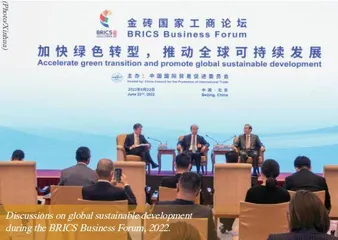BRICS Cooperation in Global Governance
作者: Wang Youming

With the common goal of rebalancing discourse power and representation in global governance, the BRICS countries share identical or similar propositions on actors, objects and methods of global governance. Since BRICS countries are quite different in political and economic systems, value systems, stages of development, and historical and cultural traditions, the concept of global governance varies greatly. Overall, what the BRICS countries are pursuing is to seek common ground and resolve differences, focus on creating a new order for the future of global governance, tighten the bond of interests, send out BRICS voices for global security governance and global development governance, and continuously inject new impetus and positive energy into the global governance system, thus making sure the BRICS cooperation mechanism advance in a sound and sustained manner.
SHARE IDENTICAL AND SIMILAR VIEWS ON GLOBAL GOVERNANCE
Who to govern, what to govern, and how to govern constitute the three core elements of global governance. Centering on the three core elements, the BRICS countries have made a clear BRICS voice on changing the unfair, unreasonable and unbalanced global governance power system.
I. Advocate pluralism and equality of global governance actors
On the issue of nation-states being the main actors of global governance, Western countries, especially the United States, advocate unipolar governance, that is, to determine the main actors of global governance as per the so-called position of power. Based on the alliance system, the United States attempts to build the Western governance system under its domination, namely peace under American governance, which is actually unilateralism. Therefore, in the eyes of the United States, global governance is actually the American version of governing the world. The BRICS countries unanimously believe that countries, big or small, are equal actors of global governance, entitled to the same right to govern global affairs within the framework of the United Nations, and oppose unilateral governance, and hegemonic governance featuring one big power. The original aspiration of BRICS cooperation is to achieve the rebalancing of the power of global governance actors, and the nature of the BRICS mechanism is a declaration of global rebalancing. Keeping this original intention in mind, the BRICS countries have been committed to promoting multilateral governance and equal governance in global affairs, and hope to build the BRICS mechanism into a model for practicing true multilateralism in the process of the reform of the global governance system.
II. Advocate inclusiveness and balance
Western countries and BRICS countries have different views on the issue of what is the main object of governance.
First, the focus of governance should be on the issue of traditional security or non-traditional security. Western countries, especially European countries, tend to make non-traditional security the top priority of global governance, and to a large extent, issues such as climate change, infectious disease prevention and control, and counter-terrorism are more important and urgent than traditional security issues. While recognizing the importance of issues such as climate change, the BRICS countries insist that solving development issues is the focus of global governance, as well as the general solution for the pandemic and conflict faced by the world. This is also the main reason why Chinese President Xi Jinping gained active support from more than 100 countries and international organizations shortly after he proposed the Global Development Initiative.
Second, the determination of the object of governance should adhere to the principle of self-interest or the principle of inclusiveness. The BRICS countries believe that since Western countries have achieved industrialization, economic development is not their top priority and urgent task; while emerging markets and developing countries are in the process of industrialization, pursuing economic development is the right thing to do. Therefore, it is inappropriate to determine the object of governance as per the principle of pragmatism and self-interest. Instead, we should take into account the concerns of multiple parties following the principle of inclusiveness. To this end, the BRICS countries unanimously oppose Western countries’ unrealistic demands on developing countries, with an aim to suppress and exploit the right to development of developing countries, under the pretext of focusing on addressing climate change.
Third, the objects of governance should be comprehensive or focused. According to the declarations made at the G7 Summits, the global governance objects determined by the Western countries are all-encompassing, particularly global affairs that do not conform to Western rules are included in their agendas as the objects of governance. The BRICS countries believe that the current and even future global governance should have a focus rather than cover too many fields. When determining the objects of governance, we should lay emphasis on the balance of world development, narrow the development gap between the north and the south, reduce the development deficit, and shift the focus of governance to the sustainable development of the vast number of developing countries, especially focusing on such issues as poverty alleviation, food security, economic recovery, employment training, education and health, green development.